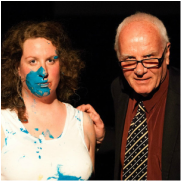Matt Loveranes

The show is presented as a personal history. Aided by projections, we see Batten’s journey right from her parents’ origins to the present. For most of the evening, Batten engages us in conversation and tells us stories about her development as an artist: drama school follies, unfortunately misogynistic nicknames and everything. These stories are familiar and her jokes may sometimes miss or share too much for some audience members but Batten is a warm and entertaining performer and like every self-effacing artist she has nerve and navigates her narrative with a professional command.
Her narrative is framed by interviews of her parents and their various opinions of her life, life choices and stage life. This may read as exploitative to some, but as the show progresses the interviews reveal themselves to be honest and filled with humour, wit and genuine affection.
There are also interludes of Batten’s various experimental performances. Among them a crazy conceptual chicken act and interpretive dance in blue paint. The best among these is a heart-warming re-enaction that involves a special Trans-Tasman call. To spoil this would be a detriment to the viewing experience.
The real X factor of the production are the appearances of Jim Batten, Bron’s lovably candid father. He is wry, relatable and a perfect foil for his daughter. What he lacks in refinement as a performer, he makes up for in gusto. A woman in my audience asks if he considers himself an artist now that he’s involved in show-business. Without missing a beat, he says that he doesn’t consider himself an artist but a show-off; the audience firmly in his fatherly corner. As he dispenses sage advice to a young man in the audience who’s had a rocky relationship with his own parents’ acceptance of his artistic vocation, you can tell that Jim shares his wisdom with notes of pride.
Not surprisingly it is the artists and the parents of artists who get the most out of and react the loudest in the audience but it is notable that the ones who are not enjoy the show just as well. Others have argued that this show lacks sophistication and although it’s far from perfect, the show’s looseness is infectious and is exactly what Fringe Festivals are made of. It’s not a surprise that this has done so well in its homeland and internationally because it succeeds not only as an exercise in experimentation and rejection of academic theatre but also because in the end it says something meaningful about love and all the adjustments and concessions that go with it. It is fitting that the show concludes with the Frank and Nancy Sinatra ditty “Something Stupid”. In the hands of the Battens, the line “And then I go and spoil it all by saying something stupid like I love you” reads not as a disturbingly almost incestuous aside but as a lighthearted but sincere acceptance and appreciation of one another, arts and all.





